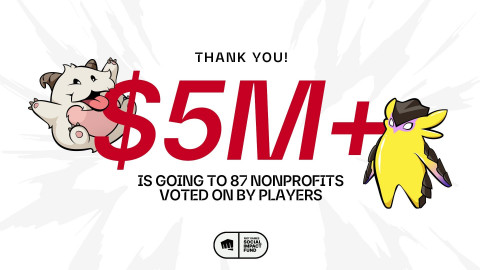
In League of Legends esports, China is one of the only two regions that have implemented a franchise system.
With the regional franchise system, each LPL team is assigned a home region, where they'll play their games in a 'home-away' system. Football, basketball, baseball, and all popular traditional sports run their leagues in this manner.
Out of the two franchised regions, however, China is the largest. Currently, the LPL has six home teams in 5 different cities, with each team building or renting their own venue.
Outside of China, not many know the details about the franchising of the LPL. To better know and understand the current state of the LPL, we spoke with the head of Tencent Interactive's Entertainment department.
Please introduce yourself.
I'm the head of Tencent's entertainment department, 'Jin Lee Bo'. I have worked in the gaming and esports industry for about 10 years now. I'm currently in charge of League of Legends, and esports marketing.
The LPL has implemented a regional franchise system. I want to hear about it in detail.
On the 30th of April 2017, Tencent and Riot Games released information regarding the franchise system and the development of esports. In September of that same year, at China's annual League of Legends festival, the first batch of LPL home cities was announced. Hangzhou's LGD, Chongqing's Snake Esports, and Chengdu's OMG were the first ones.
The LPL franchise system was put into full effect in the Spring of 2018. Additional home cities were then announced and then established in the Summer - Beijing's RNG and Xi'an's Team WE. There is also another team that will be based in Beijing starting in Spring of 2019, Team JDG.

What are the pros and cons of having a franchise system in an esports league?
In order for esports to develop into a full-fledged professional sport, the franchise system is a very important step. The system is a massive asset when it comes to promoting esports in the different cities of China. Young esports fans prefer watching their games live, so in the long run, watching esports could become a common activity for them, similar to going to a movie theatre.
The franchise system can also largely benefit the gaming organizations that are involved in it. Before, as all the LPL teams were concentrated in Shanghai, gaming organizations had limitations with gathering resources and expanding their businesses. Amateur players also faced difficulties during their transition to becoming professional players due to geographic detriments. Under the franchise system, however, gaming organizations could receive sponsorship from the government and/or new partners through their home venues. It will also allow them to secure a number of fans from their respective regions.
The organizations could run their own businesses and expand upon them. Increase in revenue through commercialization is very important for the growth of both the gaming organizations and esports as a whole.
There are also downsides to franchising. Problems could occur in labor distribution and/or funding. Additionally, the regional franchising and commercialization of the gaming organizations are still at an experimental stage, which means we need to make continuous changes to the existing mechanism; which casts uncertainty on how it will perform. For example, every home venue will need a set of staff to run the tournament. This will require a lot of workforce and time to develop.
Other unknown problems may occur in different areas, but overall, for the growth and longevity of esports, the regional franchising is the correct path to take. There is a lot to look forward to.
Has there been any support from the government?
Definitely, yes. Many things are run with help from the government. For example, gathering resources as well as running tournaments and festivals. Many cities in China have set policies that help us. The support from the government will be an important factor when selecting new home cities.
How were the fans' reactions after the implementation of the franchise system?
There was definitely a lot of debate in the beginning. To start, the franchise system was brand new, and due to the removal of the relegation system, fans worried that the players wouldn't work as hard as before. On the other hand, some fans were excited at the thought of their favorite professional player visiting their city.
In response to the fans' concern, we made a couple of official announcements. Although we've removed the previous relegation system, teams can still lose their qualification to play in the LPL. If the teams show any half-heartedness or bring any detriment to the development of the league, they'll either be warned and/or lose their rights to play in the LPL.
With that said, the franchise system encourages the development of the business districts of a region. And in order for that to happen, the home team that is based in that region will need to perform well on stage. At the moment, the main focus of the franchise system is to create a safe and reliable environment first, then make further long-term plans.
After the implementation of the franchise system in 2018, gaming organizations who are participating in the LPL have all definitely grown in size. Because of these results, many fans feel positive about the changes. Also, many fans are coming to watch the games live; as a matter of fact, the offline viewership has surpassed even traditional sports.

How are the gaming organizations' reactions towards the changes?
At first, there were a lot of concerns; some of them were against the franchising. It's because a new system will bring big changes to all the organizations. In addition, for the teams that had to leave Shanghai to go to their home cities thought that moving away would be unfavorable for them. As a result, we frequently conversed with the LPL organizations, and it didn't take long for them to accept the new system. After all, the franchise system will be very beneficial for them in the long run.
What Tencent and Riot want from this franchising is for the LPL and the organizations that are a part of it to thrive and grow together. When the industry grows larger through it, both the league and the organizations can largely benefit. With this in mind, the organizations came to understand and acknowledge the benefits that the franchise will bring. In 2018, when organizations that have yet to establish a home venue saw that a good number of the established venues were successful, they wanted to hurry and set up their own.
As a figure in the Chinese esports scene, what is your opinion on the current progress of esports in China?
Looking at the current situation, right now is a really good opportunity for further development of Chinese esports. The number of esports fans is constantly on the rise, and they're very passionate, too. The entire world is starting to acknowledge and support esports. But with that said, the industrialization and the overall size of the organizations can't catch up with the rapidly growing fanbase yet. League of Legends is China's most popular esports category, but it's only been running for 5 years, and it's only been 1 year since the franchise system was implemented.
The new franchise system will be run for years to come. With it, there are plans to industrialize, commercialize, expand, and train a larger workforce. We'll also raise the people of China's awareness of esports. In order to develop League of Legends esports into the greatest professional sport in China, we must accomplish all that we have set out to.
Sort by:
Comments :0







